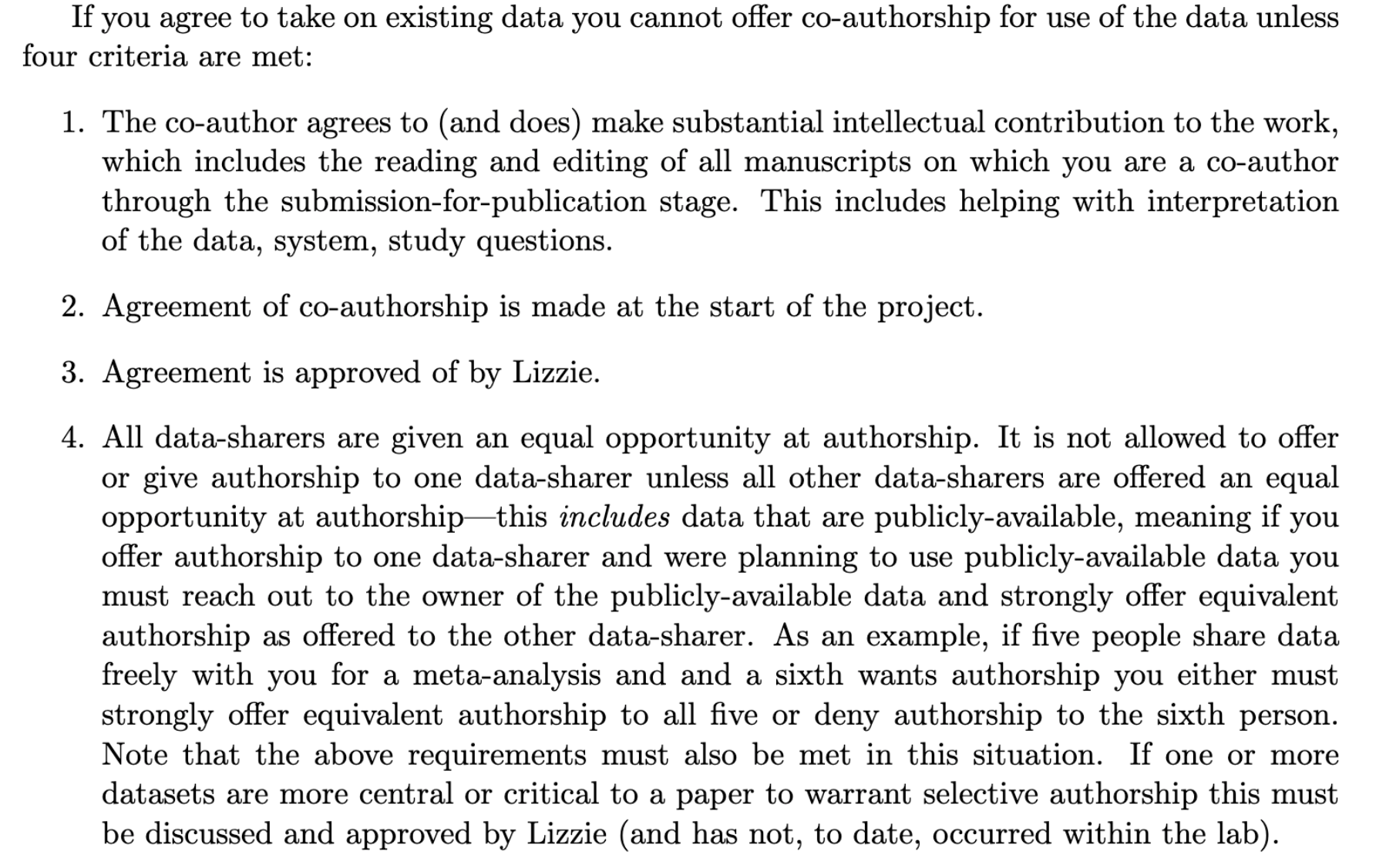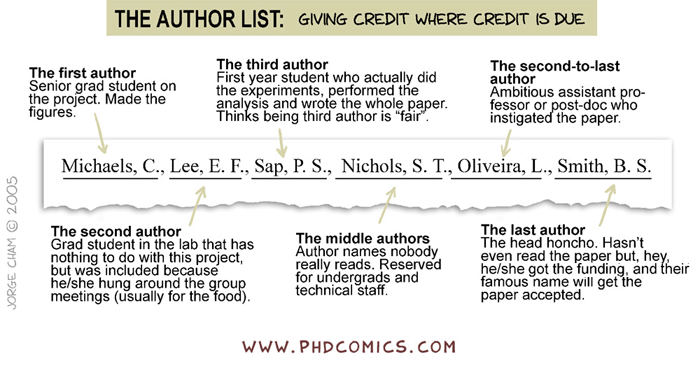7.1 Developing a Code of Conduct
Find the presentation slides for this lesson here
Whether you are joining a lab group or establishing a new collaboration, articulating a set of shared agreements about how people in the group will treat each other will help create the conditions for successful collaboration. If agreements or a code of conduct do not yet exist, invite a conversation among all members to create them. Co-creation of a code of conduct will foster collaboration and engagement as a process in and of itself, and is important to ensure all voices heard such that your code of conduct represents the perspectives of your community. If a code of conduct already exists, and your community will be a long-acting collaboration, you might consider revising the code of conduct. Having your group ‘sign off’ on the code of conduct, whether revised or not, supports adoption of the principles.
For example, the Openscapes code of conduct includes
- Be respectful
- Be direct but professional
- Be inclusive
- Understand different perspectives
- Appreciate and Accommodate Our Similarities and Differences
- Lead by Example
Understand Different Perspectives
Our goal should not be to “win” every disagreement or argument. A more productive goal is to be open to ideas that make our own ideas better. Strive to be an example for inclusive thinking. “Winning” is when different perspectives make our work richer and stronger. (openscapes.org)
Below are other example codes of conduct:
- NCEAS Code of Conduct
- Carpentries Code of Conduct
- Arctic Data Center Code of Conduct
- Mozilla Community Participation Guidelines
- Ecological Society of America Code of Conduct
7.1.2 Data Sharing and Reuse Policies
As with authorship agreements, it is valuable to establish a shared agreement around handling of data when embarking on collaborative projects. Data collected as part of a funded research activity will typically have been managed as part of the Data Management Plan (DMP) associated with that project. However, collaborative research brings together data from across research projects with different data management plans and can include publicly accessible data from repositories where no management plan is available. For these reasons, a discussion and agreement around the handling of data brought into and resulting from the collaboration is warranted and management of this new data may benefit from going through a data management planning process. Below we discuss example data agreements.
The example data policy template provided by the Arctic Data Center addresses three categories of data.
- Individual data not in the public domain
- Individual data with public access
- Derived data resulting from the project
For the first category, the agreement considers conditions under which those data may be used and permissions associated with use. It also addresses access and sharing. In the case of individual, publicly accessible data, the agreement stipulates that the team will abide by the attribution and usage policies that the data were published under, noting how those requirements we met. In the case of derived data, the agreement reads similar to a DMP with consideration of making the data public; management, documentation and archiving; pre-publication sharing; and public sharing and attribution. As research data objects receive a persistent identifier (PID), often a DOI, there are citable objects and consideration should be given to authorship of data, as with articles.
The following example lab policy from the Wolkovich Lab combines data management practices with authorship guidelines and data sharing agreements. It provides a lot of detail about how this lab approaches data use, attribution and authorship.
Below an example from Wolkovich’s Lab Data Management Policies, Section 6: Co-authorship & data.

Data Management Policies for the Wolkovich Lab - Preview
This policy is communicated with all incoming lab members, from undergraduate to postdocs and visiting scholars, and is shared here with permission from Dr Elizabeth Wolkovich.
7.1.3 Research Data Publishing Ethics
For over 20 years, the Committee on Publication Ethics (COPE) has provided trusted guidance on ethical practices for scholarly publishing. The COPE guidelines have been broadly adopted by academic publishers across disciplines, and represent a common approach to identify, classify, and adjudicate potential breaches of ethics in publication such as authorship conflicts, peer review manipulation, and falsified findings, among many other areas. Despite these guidelines, there has been a lack of ethics standards, guidelines, or recommendations for data publications, even while some groups have begun to evaluate and act upon reported issues in data publication ethics.

To address this gap, the Force 11 Working Group on Research Data Publishing Ethics was formed as a collaboration among research data professionals and the Committee on Publication Ethics (COPE) “to develop industry-leading guidance and recommended best practices to support repositories, journal publishers, and institutions in handling the ethical responsibilities associated with publishing research data.” The group released the “Joint FORCE11 & COPE Research Data Publishing Ethics Working Group Recommendations” (Puebla, Lowenberg, and WG 2021), which outlines recommendations for four categories of potential data ethics issues:
- Authorship and Contribution Conflicts
- Authorship omissions
- Authorship ordering changes / conflicts
- Institutional investigation of author finds misconduct
- Legal/regulatory restrictions
- Copyright violation
- Insufficient rights for deposit
- Breaches of national privacy laws (GPDR, CCPA)
- Breaches of biosafety and biosecurity protocols
- Breaches of contract law governing data redistribution
- Risks of publication or release
- Risks to human subjects
- Lack of consent
- Breaches of himan rights
- Release of personally identifiable information (PII)
- Risks to species, ecosystems, historical sites
- Locations of endangered species or historical sites
- Risks to communities or societies
- Data harvested for profit or surveillance
- Breaches of data sovereignty
- Risks to human subjects
- Rigor of published data
- Unintentional errors in collection, calculation, display
- Un-interpretable data due to lack of adequate documentation
- Errors of of study design and inference
- Data manipulation or fabrication
Guidelines cover what actions need to be taken, depending on whether the data are already published or not, as well as who should be involved in decisions, who should be notified of actions, and when the public should be notified. The group has also published templates for use by publishers and repositories to announce the extent to which they plan to conform to the data ethics guidelines.

7.2 Resources
- Cheruvelil, K. S., Soranno, P. A., Weathers, K. C., Hanson, P. C., Goring, S. J., Filstrup, C. T., & Read, E. K. (2014). Creating and maintaining high-performing collaborative research teams: The importance of diversity and interpersonal skills. Frontiers in Ecology and the Environment, 12(1), 31-38. DOI: 10.1890/130001
- Carroll, S. R., Garba, I., Figueroa-Rodríguez, O. L., Holbrook, J., Lovett, R., Materechera, S., … Hudson, M. (2020). The CARE Principles for Indigenous Data Governance. Data Science Journal, 19(1), 43. DOI: http://doi.org/10.5334/dsj-2020-043
